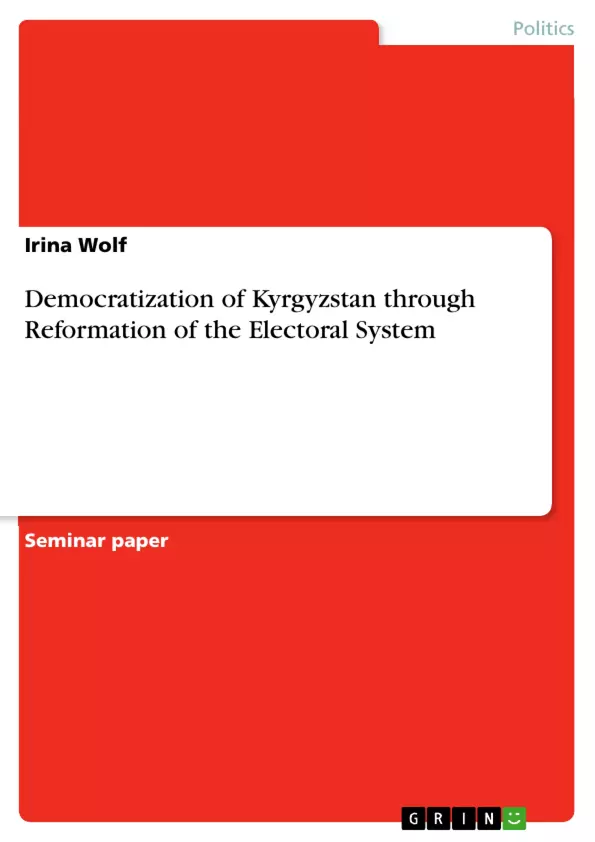Given the fact that none of the international declarations, conventions or covenants establishes a type of electoral or party systems, which is more democratic than others, it is a sole prerogative of a sovereign state to decide, which system to follow - majoritarian, proportional representation, mixed, or any other – while starting or continuing the process of democratization. The problem is that incumbent politicians can manipulate the electoral system in such a way as to ensure victory during next elections to preserve their power. Kyrgyzstan is precisely such a case. Although, during 14 years of country’s independence the electoral system has undergone major transformations three times, the current electoral system can hardly be named democratic. Furthermore, after the Kyrgyz opposition took over power on 24th March, 2005, one of the first requirements of the civil society was revision of the constitution, including reformation of the electoral system.
Having come across The New International IDEA Handbook on Electoral System Design, it became increasingly interesting for me to make an attempt to design the electoral system for Kyrgyzstan to make it more democratic. Apart from using the handbook on Electoral System Design, the methods of research include analysis of reports of international organizations such as OSCE and ICG related to the topic.
Hypothesis of the author is the following. In order to ‘democratize’ Kyrgyzstan, i.e. to make the decision-making process more inclusive, to ensure that majority of voices is heard, and to secure that regional, clan and minorities’ interests are taken into account, it is necessary, inter alia, to introduce Parallel electoral system, i.e. half of the seats in the parliament is to be elected by FPTP run-off in single-member constituencies while the other half of the seats is to be elected by PR closed party lists.
Inhaltsverzeichnis (Table of Contents)
- Introduction
- Evolving of the Kyrgyz Electoral System since 1991
- Parallel system in Kyrgyzstan: advantages and disadvantages.
Zielsetzung und Themenschwerpunkte (Objectives and Key Themes)
This paper examines the electoral system in Kyrgyzstan and proposes a potential reform based on the "Parallel" system to create a more inclusive and democratic process. The author aims to analyze the historical development of the electoral system in Kyrgyzstan since its independence, assess the shortcomings of the current system, and argue for the benefits of implementing a Parallel system.- Historical Evolution of the Kyrgyz Electoral System
- Shortcomings of the Current System
- Advantages of the Parallel Electoral System
- Ensuring Regional, Ethnic, and Gender Representation
- Addressing Vote-Buying and Promoting Party Development
Zusammenfassung der Kapitel (Chapter Summaries)
Introduction
The introduction highlights the inherent right of sovereign states to choose their electoral system while emphasizing the potential for manipulation by incumbent politicians. It points to the Kyrgyz electoral system as an example of this manipulation and the need for reform.Evolving of the Kyrgyz Electoral System since 1991
This chapter examines the evolution of the Kyrgyz electoral system since independence in 1991. It highlights the shifts between unicameral and bicameral structures, changes in the number of deputies, and the use of different voting systems. The chapter highlights the historical context of the current system and the need for a stable and representative model.Parallel system in Kyrgyzstan: advantages and disadvantages.
This chapter analyzes the potential advantages and disadvantages of implementing a "Parallel" electoral system in Kyrgyzstan, focusing on six key criteria: regional, ideological, ethnic, and gender representation; difficulty in vote-buying; party development; accountability; financial sustainability; and ease of understanding. The author discusses the potential benefits of the Parallel system in addressing the issues of representation, accountability, and stability, while acknowledging the need for careful implementation to mitigate potential drawbacks.Frequently Asked Questions
What is the main goal of the proposed electoral reform in Kyrgyzstan?
The goal is to make the decision-making process more inclusive and democratic by ensuring that regional, clan, and minority interests are properly represented in parliament.
What is a "Parallel" electoral system?
In a Parallel system, half of the parliamentary seats are elected via a majoritarian system (First Past The Post) in single-member constituencies, while the other half are elected through Proportional Representation (PR) using party lists.
How has the Kyrgyz electoral system changed since 1991?
Since independence, the system has undergone three major transformations, shifting between unicameral and bicameral structures and changing the number of deputies to suit the interests of incumbent politicians.
Can electoral systems prevent political manipulation?
While no system is perfect, the author argues that a well-designed Parallel system can reduce the ability of incumbent politicians to ensure victory through manipulation and vote-buying.
How does the reform address gender and ethnic representation?
By introducing a Proportional Representation component through party lists, it becomes easier to implement quotas and ensure that women and ethnic minorities have a guaranteed voice in the legislature.
- Citar trabajo
- Irina Wolf (Autor), 2006, Democratization of Kyrgyzstan through Reformation of the Electoral System, Múnich, GRIN Verlag, https://www.grin.com/document/130071



